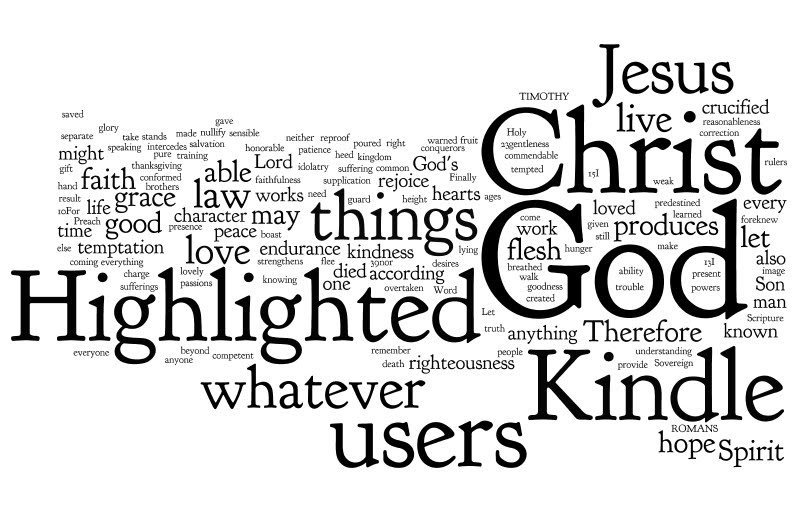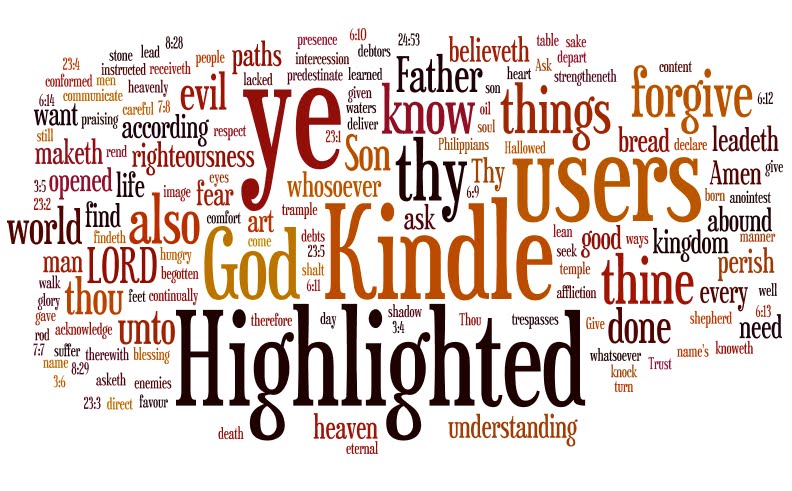I love our kindle. I’m playing with some of its features as I use it to study today. I’ve set up a new Twitter account for the passages I highlight in the books I’m reading. You can keep tabs on it in the sidebar (on my actual blog for you feed readers). One of Amazon’s nifty features (which I’ve mentioned before somewhere) is displaying paragraphs other people have highlighted on their devices. I thought it might be fun to look at the different interests of people who have self selected as ESV readers and KJV readers of the Bible. The ESV is the fifth most highlighted book on the Kindle, the most popular KJV version comes in at 109.
Here are the popular ESV passages.
“…and we [3] rejoice [4] in hope of the glory of God. 3 More than that, we rejoice in our sufferings, knowing that suffering produces endurance, 4and endurance produces character, and character produces hope, 5 and hope does not put us to shame, because God’s love has been poured into our hearts through the Holy Spirit who has been given to us. 6 For while we were still weak, at the right time Christ died for the ungodly – Highlighted by 100 Kindle users
“…because [6] the Spirit intercedes for the saints according to the will of God. 28 And we know that for those who love God all things work together for good, [7] for those who are called according to his purpose. 29 For those whom he foreknew he also predestined to be conformed to the image of his Son… – Highlighted by 97 Kindle users
“37No, in all these things we are more than conquerors through him who loved us. 38For I am sure that neither death nor life, nor angels nor rulers, nor things present nor things to come, nor powers, 39 nor height nor depth, nor anything else in all creation, will be able to separate us from the love of God in Christ Jesus our Lord. God’s Sovereign Choice ROMANS 9 I am speaking the truth in Christ—I am not lying… – Highlighted by 113 Kindle users
“12Therefore let anyone who thinks that he stands take heed lest he fall. 13No temptation has overtaken you that is not common to man. God is faithful, and he will not let you be tempted beyond your ability, but with the temptation he will also provide the way of escape, that you may be able to endure it. 14 Therefore, my beloved, flee from idolatry. 15 I speak as to sensible people; judge for yourselves what I say. – Highlighted by 73 Kindle users
“19 For through the law I died to the law, so that I might live to God. 20 I have been crucified with Christ. It is no longer I who live, but Christ who lives in me. And the life I now live in the flesh I live by faith in the Son of God, who loved me and gave himself for me. 21 I do not nullify the grace of God, for if righteousness [2] were through the law… – Highlighted by 92 Kindle users
“…as I warned you before, that those who do such things will not inherit the kingdom of God. 22 But the fruit of the Spirit is love, joy, peace, patience, kindness, goodness, faithfulness, 23gentleness, self-control; against such things there is no law. 24 And those who belong to Christ Jesus have crucified the flesh with its passions and desires. – Highlighted by 112 Kindle users
“in the coming ages he might show the immeasurable riches of his grace in kindness toward us in Christ Jesus. 8 For by grace you have been saved through faith. And this is not your own doing; it is the gift of God, 9 not a result of works, so that no one may boast. 10 For we are his workmanship, created in Christ Jesus for good works, which God prepared beforehand, that we should walk in them. One in Christ 11 Therefore remember that at one time you Gentiles in the flesh…” – Highlighted by 126 Kindle users
“…again I will say, Rejoice. 5 Let your reasonableness be known to everyone. The Lord is at hand; 6 do not be anxious about anything, but in everything by prayer and supplication with thanksgiving let your requests be made known to God. 7And the peace of God, which surpasses all understanding, will guard your hearts and your minds in Christ Jesus. 8†Finally, brothers, whatever is true, whatever is honorable, whatever is just, whatever is pure, whatever is lovely, whatever is commendable… – Highlighted by 178 Kindle users
In any and every circumstance, I have learned the secret of facing plenty and hunger, abundance and need. 13 I can do all things through him who strengthens me. 14 Yet it was kind of you to share [3] my trouble. – Highlighted by 122 Kindle users
…which are able to make you wise for salvation through faith in Christ Jesus. 16 All Scripture is breathed out by God and profitable for teaching, for reproof, for correction, and for training in righteousness, 17 that the man of God [2] may be competent, equipped for every good work. Preach the Word 2 TIMOTHY 4 ‡†I charge you in the presence of God and of Christ Jesus… – Highlighted by 69 Kindle users
Here are the KJV mob’s favourites:
“…and shall declare his righteousness unto a people that shall be born, that he hath done this. 23:1 The LORD is my shepherd; I shall not want. 23:2 He maketh me to lie down in green pastures: he leadeth me beside the still waters. 23:3 He restoreth my soul: he leadeth me in the paths of righteousness for his name’s sake. 23:4 Yea, though I walk through the valley of the shadow of death, I will fear no evil: for thou art with me; thy rod and thy staff they comfort me. 23:5 Thou preparest a table before me in the presence of mine enemies: thou anointest my head with oil…
Highlighted by 46 Kindle users
…3:4 So shalt thou find favour and good understanding in the sight of God and man. 3:5 Trust in the LORD with all thine heart; and lean not unto thine own understanding. 3:6 In all thy ways acknowledge him, and he shall direct thy paths. 3:7 Be not wise in thine own eyes: fear the LORD, and depart from evil. 3…
Highlighted by 37 Kindle users
…for your Father knoweth what things ye have need of, before ye ask him. 6:9 After this manner therefore pray ye: Our Father which art in heaven, Hallowed be thy name. 6:10 Thy kingdom come, Thy will be done in earth, as it is in heaven. 6:11 Give us this day our daily bread. 6:12 And forgive us our debts, as we forgive our debtors. 6:13 And lead us not into temptation, but deliver us from evil: For thine is the kingdom, and the power, and the glory, for ever. Amen. 6:14 For if ye forgive men their trespasses, your heavenly Father will also forgive you: 6… Highlighted by 37 Kindle users
…lest they trample them under their feet, and turn again and rend you. 7:7 Ask, and it shall be given you; seek, and ye shall find; knock, and it shall be opened unto you: 7:8 For every one that asketh receiveth; and he that seeketh findeth; and to him that knocketh it shall be opened. 7:9 Or what man is there of you, whom if his son ask bread, will he give him a stone? – Highlighted by 29 Kindle users
…24:53 And were continually in the temple, praising and blessing God. Amen… – Highlighted by 36 Kindle users
…3:15 That whosoever believeth in him should not perish, but have eternal life. 3:16 For God so loved the world, that he gave his only begotten Son, that whosoever believeth in him should not perish, but have everlasting life. 3:17 For God sent not his Son into the world to condemn the world… – Highlighted by 77 Kindle users
…because he maketh intercession for the saints according to the will of God. 8:28 And we know that all things work together for good to them that love God, to them who are the called according to his purpose. 8:29 For whom he did foreknow, he also did predestinate to be conformed to the image of his Son… – Highlighted by 33 Kindle users
…wherein ye were also careful, but ye lacked opportunity. 4:11 Not that I speak in respect of want: for I have learned, in whatsoever state I am, therewith to be content. 4:12 I know both how to be abased, and I know how to abound: every where and in all things I am instructed both to be full and to be hungry, both to abound and to suffer need. 4:13 I can do all things through Christ which strengtheneth me. 4:14 Notwithstanding ye have well done, that ye did communicate with my affliction. 4:15 Now ye Philippians know also… – Highlighted by 11 Kindle users
And here they are as wordles.
The ESV one.

And the KJV one.

Farbeit from me to make judgments about people’s theology based on which translation they choose. There are a few similarities there, that cancel each other out for the purposes of comparison – what’s really interesting is the outliers. The KJV texts have a bias to quotes from Jesus, and seem to be predominantly about prayer. Intecessory prayer in fact. The ESV texts are predominantly Pauline, and if you had to pick a few themes they’d be the Spirit, suffering, and God’s grace.
Let the reader understand.


